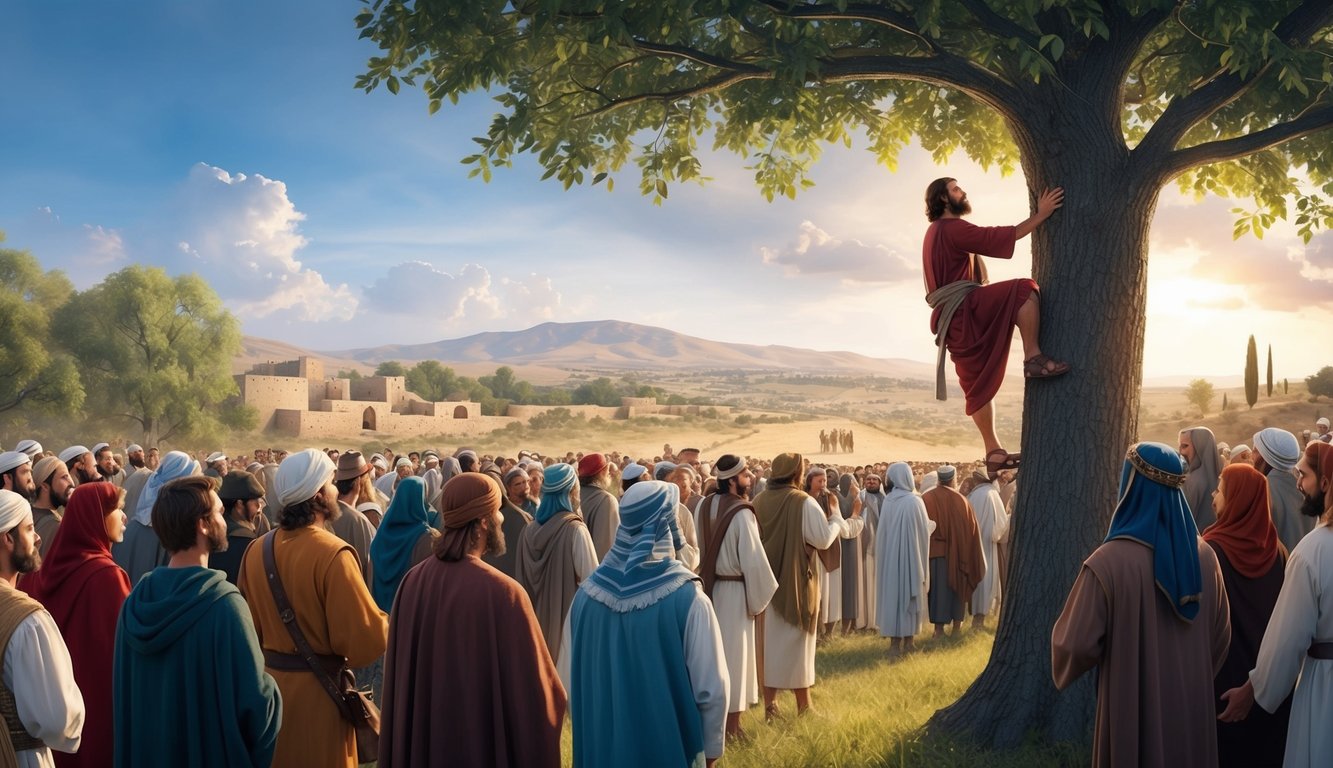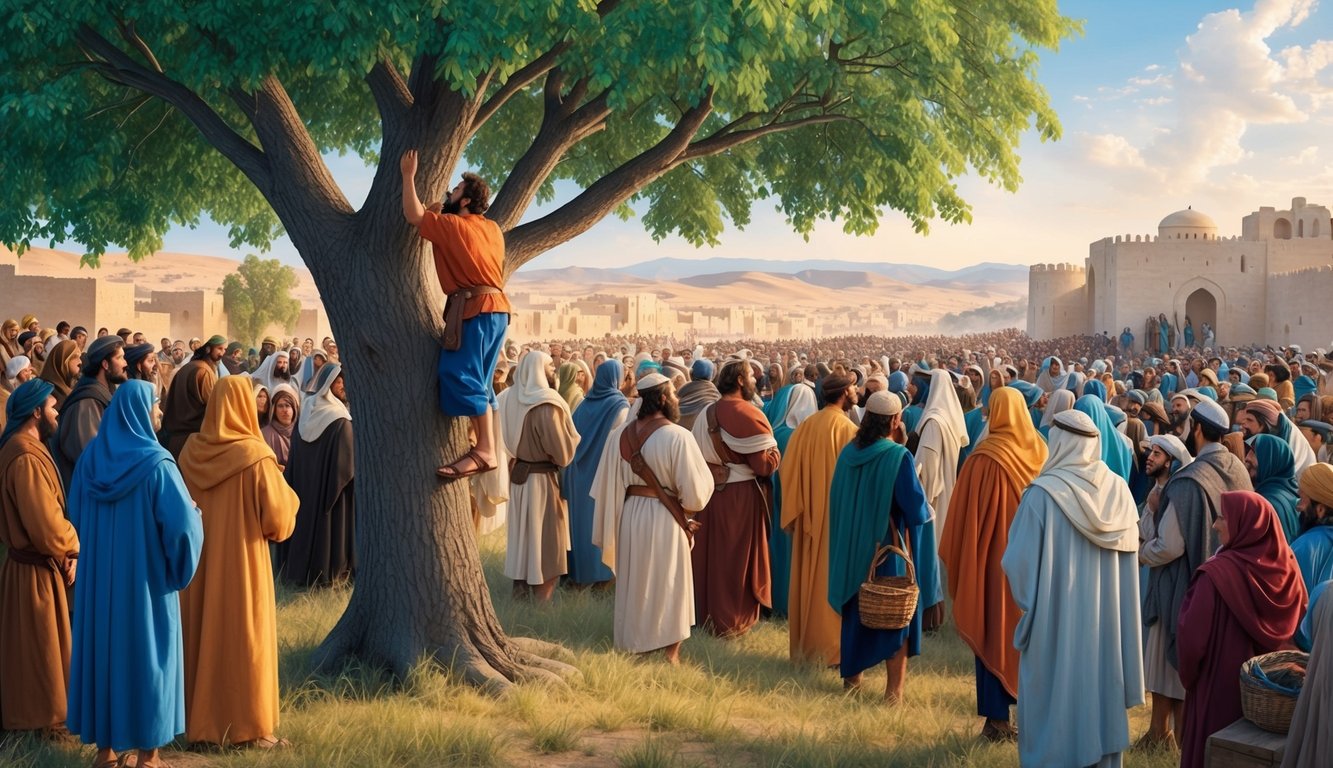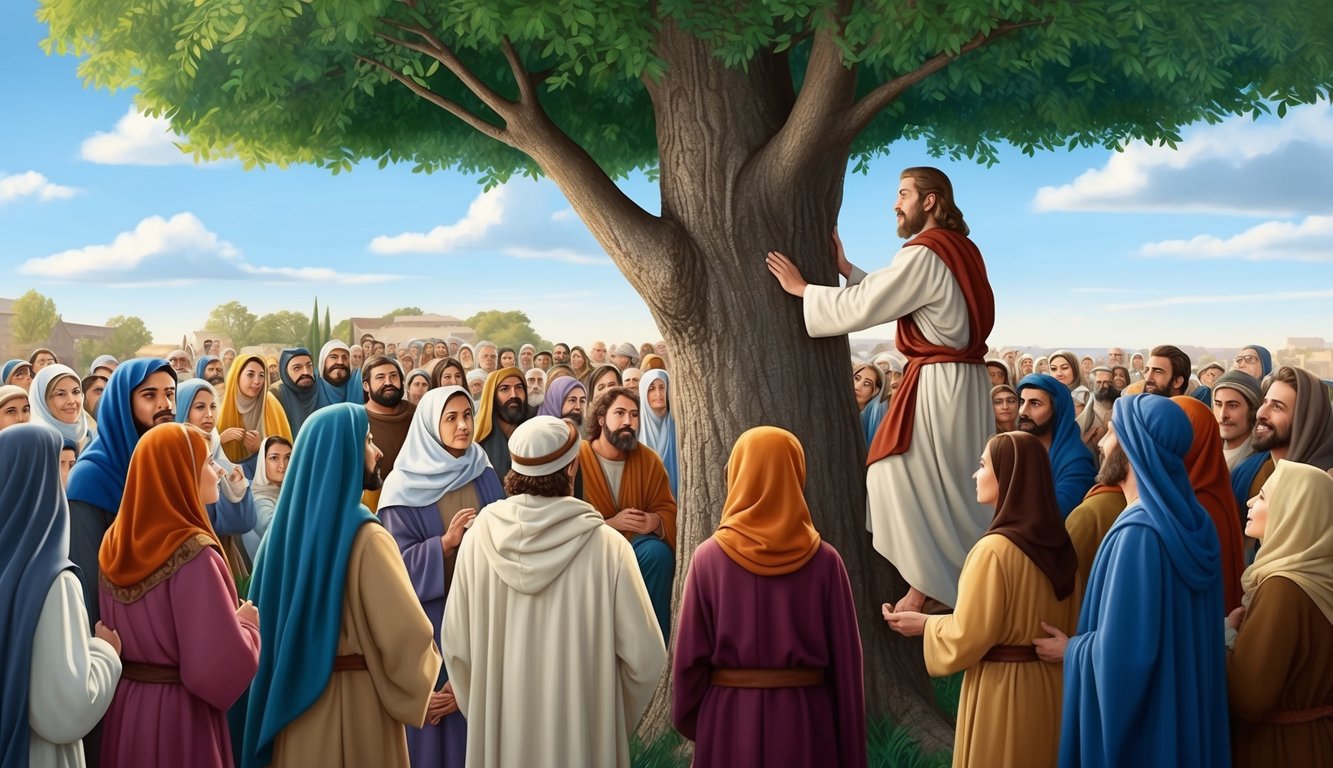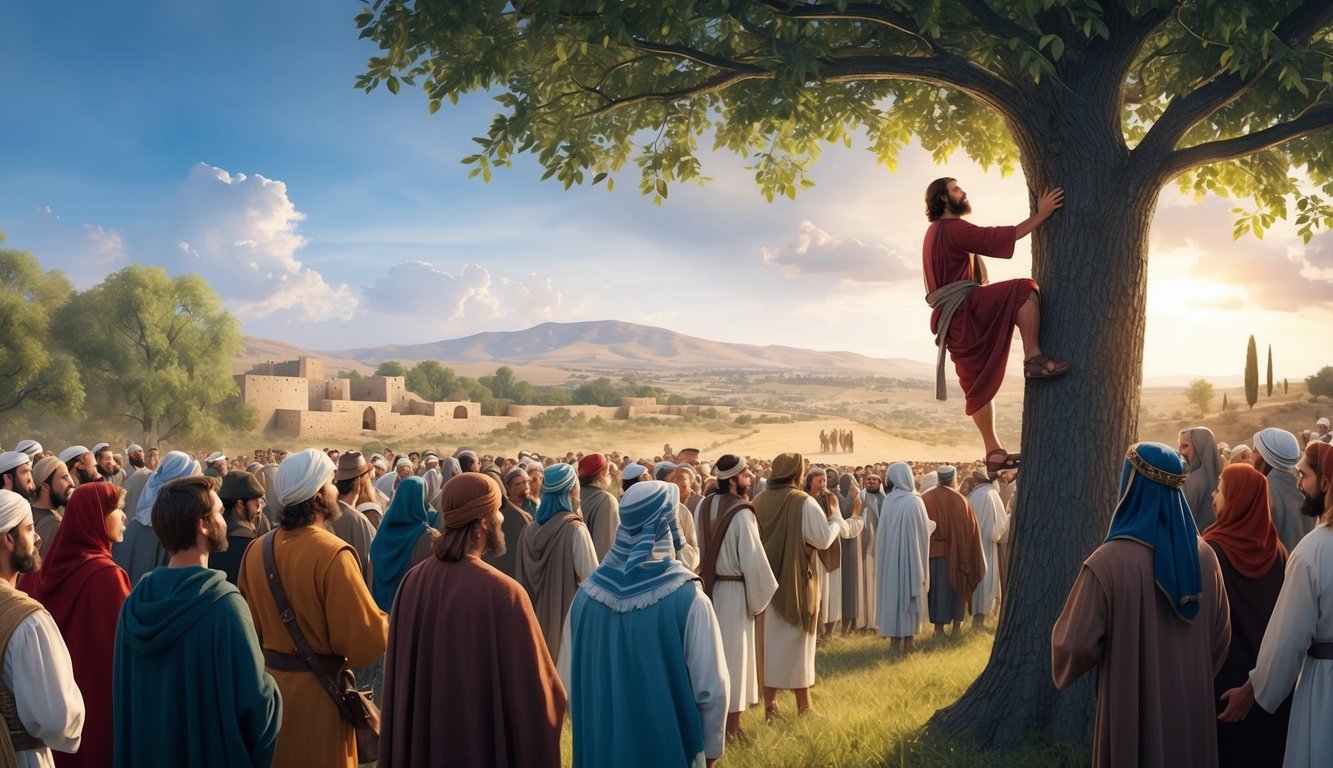Don’t Miss Out On This Unique Astrological Opportunity
Are you tired of spinning your wheels and getting nowhere? Simply put, you’re out of sync: you’re out of alignment with your astral configuration.
But: there’s a kind of map that can help you reclaim your alignment. Think of it as your own personal blueprint to success and happiness: a blueprint that will help you live your most amazing life.
Get started here.
Zacchaeus, a wealthy tax collector in Jericho, is often remembered for his short stature, but his story holds a much deeper significance. Through his encounter with Jesus, you will see how a single moment can lead to profound change and a commitment to living a better life. This account in Luke 19:1-10 not only highlights the importance of seeing Jesus but also demonstrates how faith can lead to transformation.

As you explore this story, consider Zacchaeus’s journey from being an outcast to experiencing the grace of salvation.
His desire to meet Jesus and the steps he took to overcome his obstacles show that belief can inspire action.
You too might find encouragement in how this interaction with Christ can redefine one’s life and purpose.
The message of Jesus reaching out to those considered lost is powerful.
It illustrates a profound truth: no one is beyond the reach of His love and redemption.
Join us as we dive deeper into this transformative story and uncover the lessons that can resonate in your own life.
Key Takeaways
- Zacchaeus’s encounter with Jesus leads to a significant personal transformation.
- The narrative emphasizes the importance of reaching out to those in need of grace.
- Salvation is available to everyone, showing that true change is possible.
Zacchaeus: The Chief Tax Collector in Jericho
Zacchaeus was a notable figure in Jericho, both for his role as a chief tax collector and for his wealth.
This section explores the context of tax collectors during that time and provides insight into Zacchaeus’ status in society.
Historical Context of Tax Collectors
In ancient Judea, tax collectors often held a negative reputation.
They were seen as traitors by many because they collected taxes for the Roman Empire.
Most people viewed them as dishonest, often taking more than what was due.
Tax collectors, including Zacchaeus, were usually Jews who worked under Roman authority.
This role allowed them to gain substantial wealth, but it also placed them at odds with their communities.
Because they were perceived as greedy, they often faced social isolation.
Zacchaeus, being a chief tax collector, had authority over other tax collectors.
This position meant he collected taxes not just for himself, but also supervised those working under him.
Wealth and Status of Zacchaeus
Zacchaeus was described as wealthy.
His riches came from collecting taxes, often at the expense of his fellow Jews.
Wealth in that era provided power and influence, but it also led to prejudice.
His height played a role in his story.
Zacchaeus was short, which meant he struggled to see over the crowds gathered to see Jesus.
This limitation prompted him to climb a sycamore-fig tree, showcasing his determination to witness Jesus despite the obstacles he faced.
Zacchaeus’ wealth and status made him a unique character in the narrative.
His encounter with Jesus highlights themes of redemption and transformation, showing how one can change regardless of their past.
The Encounter with Jesus
Zacchaeus had a unique encounter with Jesus that changed his life.
This section explores how Zacchaeus tried to see Jesus, the importance of the sycamore tree in this story, and the moment Jesus called him.
Zacchaeus’ Effort to See Jesus
Zacchaeus was a chief tax collector in Jericho and was known for being wealthy.
He wanted to see Jesus as He passed through the city.
However, Zacchaeus was short and could not see over the crowd.
Determined to catch a glimpse of Jesus, he ran ahead and climbed a sycamore-fig tree.
This effort shows his eagerness and curiosity.
Climbing a tree was unusual for a man of his status.
It highlights his desire to encounter Jesus despite the obstacles in his way.
The Significance of the Sycamore Tree
The sycamore-fig tree plays a crucial role in this story.
Zacchaeus used it as a vantage point to see Jesus.
The tree’s sturdy branches provided him a safe place to wait.
This tree symbolizes the lengths people go to seek Jesus.
It also illustrates how Jesus meets us where we are, irrespective of our challenges.
The tree served not only as a viewpoint but as a reminder that seeking Jesus often requires effort and courage.
Jesus’ Call to Zacchaeus
When Jesus reached the spot under the tree, He looked up and called Zacchaeus by name.
This moment was profound as it showed that Jesus knew him personally.
Jesus said, “Zacchaeus, come down immediately.
I must stay at your house today.” This call was not just an invitation; it signified acceptance and love.
Zacchaeus joyfully descended from the tree, excited about this encounter.
Jesus sought him out, showing that everyone, regardless of their past, can have a relationship with Him.
Transformation and Commitment to Restitution
Zacchaeus experienced a remarkable change after his encounter with Jesus.
This transformation led him to commit to giving back and supporting those in need.
His actions highlighted the importance of taking responsibility for one’s past choices.
Zacchaeus’ Pledge to Give to the Poor
After meeting Jesus, Zacchaeus declared he would give half of his wealth to the poor.
This was a significant commitment, especially for a wealthy tax collector.
By choosing to support the less fortunate, he demonstrated a shift in his values.
Zacchaeus’ actions reflect his newfound understanding of generosity.
By prioritizing the needs of the poor, he embraced a spirit of compassion.
This pledge not only marked his transformation but also served as a public statement of his faith.
The Promise to Pay Back Those Defrauded
In addition to pledging to give to the poor, Zacchaeus promised to pay back anyone he had defrauded.
He stated he would return four times the amount he took.
This commitment to restitution shows his desire to make things right and restore relationships.
This act underlines the seriousness of his transformation.
Zacchaeus recognized the harm his actions caused and wanted to fix it.
His promise to repay those he wronged is a powerful reminder that true repentance involves action, not just words.
Salvation Comes to the Sinner’s House
In this passage, you see how Jesus offers acceptance to those considered sinners.
His actions toward Zacchaeus highlight the theme of salvation reaching even the most unlikely people.
Let’s explore how Jesus welcomed Zacchaeus and the reactions from the crowd.
Acceptance of Zacchaeus by Jesus
Zacchaeus was a chief tax collector and very rich.
He held a position that many viewed with contempt.
Tax collectors often took more than they should, making them unpopular.
When Jesus came to Jericho, Zacchaeus wanted to see who He was.
Despite being short, he climbed a sycamore tree to get a better view.
Jesus noticed him and called him by name, saying He would stay at Zacchaeus’s house.
This moment shows the compassion of Jesus.
He reached out to Zacchaeus, directly challenging societal beliefs.
By accepting him, Jesus welcomed a sinner into His love and showed that no one is beyond redemption.
This act of friendship paved the way for Zacchaeus’s transformation.
Criticism from the Onlookers
While Jesus embraced Zacchaeus, the crowd reacted harshly.
People began to grumble, saying, “He has gone to be the guest of a sinner.” This criticism came from those who expected Jesus to associate only with the righteous and the pious.
Tax collectors were seen as traitors, and their choices often led them away from faith.
The crowd’s judgment highlights a common belief: sinners deserve to be condemned.
However, Jesus’s choice to dine with Zacchaeus teaches a profound lesson about grace.
You can see that Jesus’s ministry was about reaching out to the lost, regardless of their past.
He challenged the norms, showing that salvation is available to everyone, even the rich man who lived in sin.
The Mission of the Son of Man

Jesus, known as the Son of Man, had a clear mission during His time on Earth.
His goal was to seek out and save the lost, offering salvation to those who needed it most.
Through His actions and teachings, He showed that everyone, even the outcasts, could find a place in God’s love.
The Purpose of Jesus’ Ministry
The purpose of Jesus’ ministry was to reach those who were lost.
He wanted to save people from their sins and restore them to a right relationship with God.
-
Seeking the Lost: Jesus actively sought out individuals, like Zacchaeus, who felt disconnected from their faith. He saw value in everyone, no matter their past.
-
Offering Salvation: The message of salvation was central to His mission. He preached hope and healing, inviting people to repent and embrace grace.
-
Bringing Back the Outcasts: Jesus often reached those who were marginalized. He identified Himself as the Son of Abraham, showing that His love extended to all, particularly those society overlooked.
This mission was not only about forgiving sins but also about transforming lives through the power of love and acceptance.
Frequently Asked Questions

Here you will find answers to common questions about Luke 19:1-10, focusing on the story of Zacchaeus and its lessons.
Each question sheds light on different aspects of this well-known passage.
What is the moral lesson of Luke 19:1-10?
The story teaches that no one is beyond redemption.
Zacchaeus, a tax collector, was considered a sinner.
When he repented and showed faith, Jesus welcomed him, highlighting God’s ability to transform lives.
What is the meaning of the story of Zacchaeus?
Zacchaeus was small in stature but big in desire to see Jesus.
He climbed a tree to catch a glimpse of Him.
This story emphasizes that seeking Jesus actively can lead to a meaningful relationship with Him.
What is the main message of Luke 19?
The main message revolves around Jesus’ mission to seek and save the lost.
It shows that God’s love is available to everyone, regardless of their past actions or social standing.
Jesus’ teachings emphasize compassion, forgiveness, and redemption for all who turn to Him.
This is evident in various passages, including Mark 6 Return to Nazareth, where He faces rejection but continues His mission with unwavering faith.
His life serves as a reminder that no one is beyond God’s grace, and His love extends to all who seek Him.
Why did Jesus call Zacchaeus by his name?
Jesus called Zacchaeus by name to show His personal connection and knowledge of him.
This act demonstrates that Jesus knows each of us individually, emphasizing a personal relationship with Him.
How is Luke 19:1-10 represented differently in various Bible translations?
Different translations may use varied wording, but the core message remains the same.
While some versions might simplify phrases or use contemporary language, they all communicate Zacchaeus’s transformation and Jesus’ invitation to him.
How can the story of Zacchaeus in Luke 19:1-10 be explained to children?
You can explain that Zacchaeus was a short man who really wanted to see Jesus.
He climbed a tree, and Jesus noticed him.
This shows kids that everyone can be loved by Jesus, no matter how small they feel.



